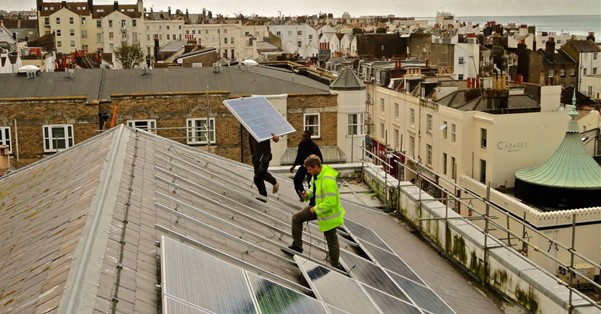 Solar electricity systems capture the sun's energy using photovoltaic (or PV) cells. PV cells convert sunlight into electricity, which can be used to run appliances, lighting and electric heating systems. Solar Photovoltaic technology potentially offers churches an opportunity to reduce their carbon footprint and energy bills
Solar electricity systems capture the sun's energy using photovoltaic (or PV) cells. PV cells convert sunlight into electricity, which can be used to run appliances, lighting and electric heating systems. Solar Photovoltaic technology potentially offers churches an opportunity to reduce their carbon footprint and energy bills
Solar PV panels and the Diocese of Bristol
The Diocese of Bristol has installed solar photovoltaic (PV) panels on dozens of properties, mainly parsonage houses, across the diocese. A number of parishes, including those with grade-listed buildings, have installed solar PV on their roofs.
These include;
-
St Mary, Marshfield
-
St Michael and All Angels, Bedminster
-
St Edyth’s, Sea Mills
-
St Peter, Frampton Cottrell
-
Holy Trinity, Westbury-on-Trym
-
St Andrew, Avonmouth
Your church and solar PV
The Church of England Environment Programme has produced advice for churches exploring solar PV:
-
A webinar on solar PV provides an introduction to solar PV panel technology, its applications, usage and on-going benefits that accrue to system owners. It includes the steps involved in developing a Solar PV project from assessment, survey, technical & electrical engineering design, battery storage options, council planning & DAC application and approval processes, and the installation process, testing, commissioning & certification, on-going maintenance, and funding through the Smart Export Guarantee Scheme.
-
The MCS (Microgeneration Certification Scheme) is a certification program in the UK that ensures high standards and safety for photovoltaic (PV) installations. It certifies installers and products, ensuring compliance with specific guidelines and codes of practice. The scheme covers installation standards, product requirements, performance monitoring, and consumer protection. By adhering to the MCS Scheme, consumers can trust the quality and
English Heritage has a webpage on Climate Change and Places of Worship that includes guidelines on solar PV and places of worship.